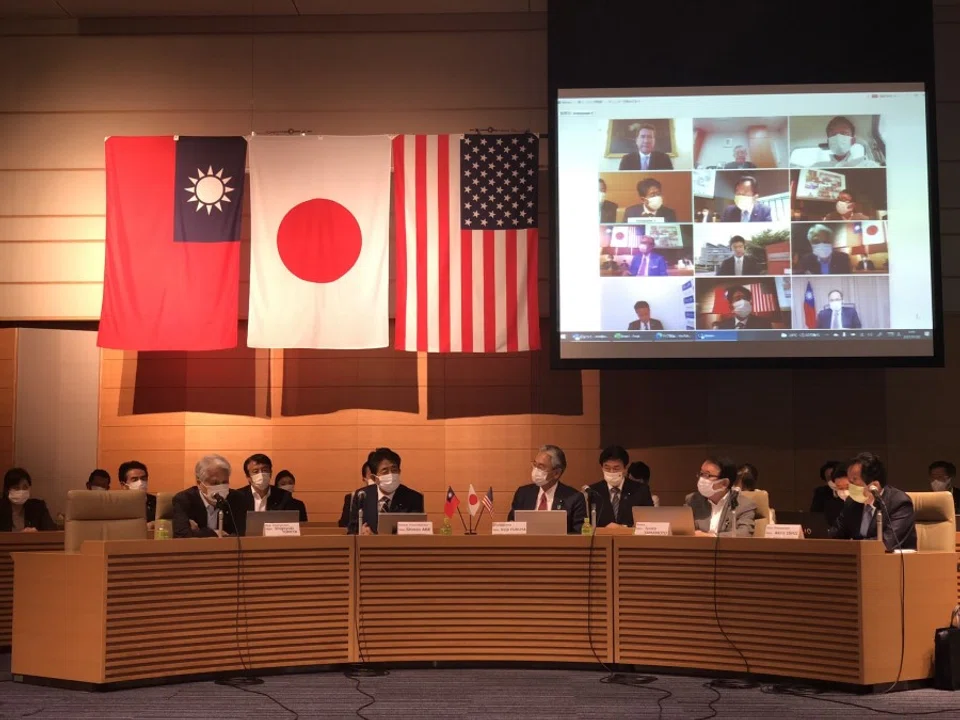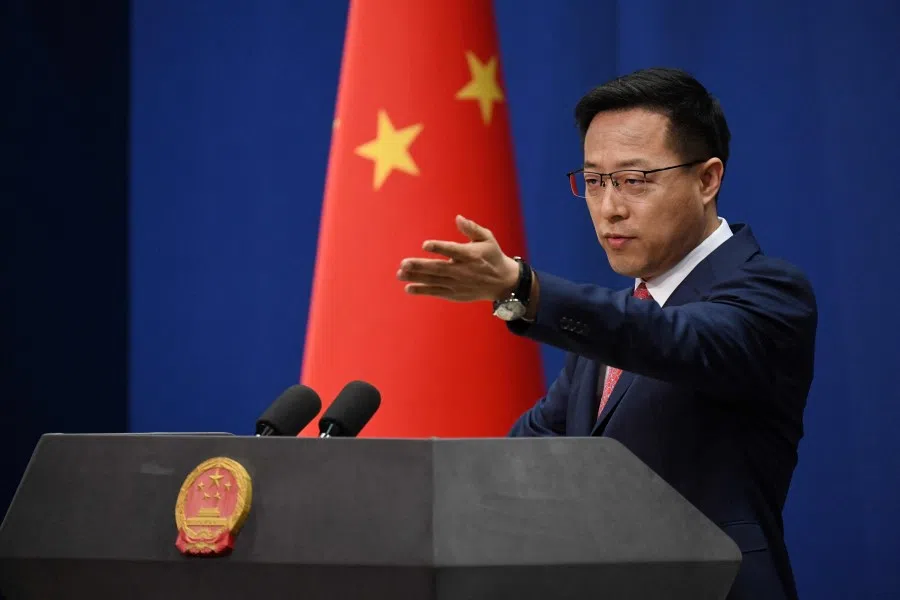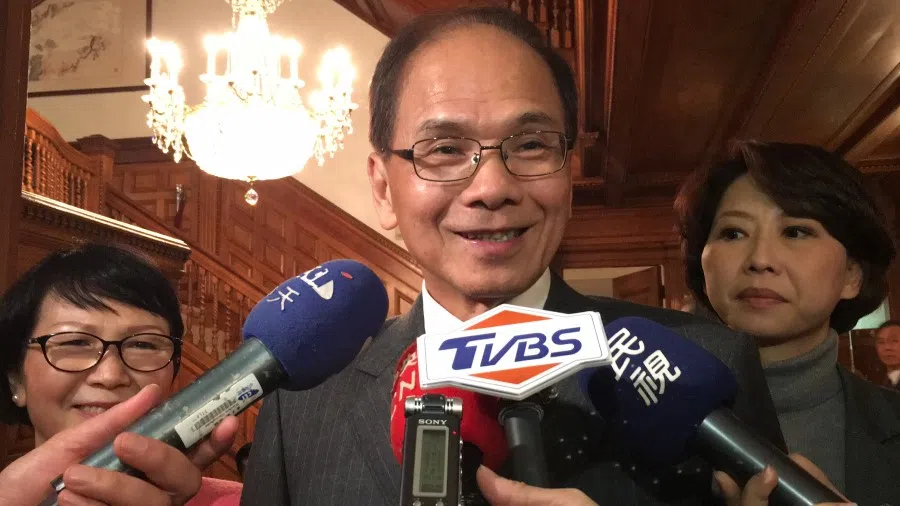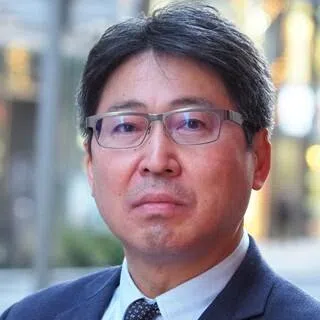Japanese researcher: Japan-US-Taiwan lawmaker exchanges unavoidable now that China is a world power
The Japan-US-Taiwan Trilateral Strategic Dialogue was held recently, much to the chagrin of China. It was also the first time that all three parties had met directly to hold a lawmaker exchange. Japanese academic Shin Kawashima says China should accept that such discussions about China would become more frequent as its influence continues to rise. China should also make clear what it considers problematic with such meetings.

On 29 July, the Japan-US-Taiwan Trilateral Strategic Dialogue was held online, coordinated by the National Graduate Institute for Policy Studies (GRIPS). US senator Bill Hagerty (former US ambassador to Japan), Taiwan's Legislative Yuan Speaker You Si-kun, Japan-Republic of China (ROC) Diet Members' Consultative Council chairman Keiji Furuya, and other cross-party lawmakers participated, with former Prime Minister Shinzo Abe taking part as a guest speaker.
The participating lawmakers did not belong to the ruling party but were so-called cross-party lawmakers. It is unclear what was discussed since the meeting was held under the Chatham House Rule, but based on media reports and other sources, it appears that the meeting was held with China in mind. In his speech, Abe said that they must not let Taiwan end up like Hong Kong and called for a common understanding of the challenges posed by China.
The meeting was reported in Japanese, American, and Taiwanese media, but Chinese foreign ministry spokesperson Zhao Lijian strongly objected to it, commenting, "The so-called 'dialogue' [you mentioned] has no influence whatsoever. It is negative and wrong in both form and content. In fact, it plays the same old tune that no one cares to listen to."
Even if a trilateral meeting between Japan, the US and Taiwan took place this time, it shouldn't be seen as a departure from the earlier "one-China policy".

However, although the "one-China principle" in US-China and Japan-China relations puts certain limits on interactions with Taiwan by government leaders, cabinet members, and senior officials, the lawmaker exchanges have been held as usual. As relations with Taiwan are limited to "practical business", the main method of interacting with Taiwan has become the lawmaker exchanges, both for Japan and for the US. Moreover, this kind of strategic dialogue between the US and Taiwan, and between Japan and Taiwan, is actually not uncommon as such dialogues have been conducted through a large number of Track 1.5 meetings (between government officials and non-governmental experts), centring around think tanks, often with lawmakers present.
So, what was so "new" about the meeting this time? It was that the three parties - Japan, the US and Taiwan - held the meeting. It is true that Japan-US-Taiwan meetings have been held on the non-governmental level and that lawmakers have likely been in attendance. Moreover, bilateral lawmaker exchanges between the US and Taiwan and between Japan and Taiwan have been held as lawmaker diplomacy, but this was probably the first time that all three parties met directly to hold a lawmaker exchange.
Yet if we consider the "one-China policy" adopted by Japan and the US, such exchanges have been held with Taiwan in the past and that was never really thought of as particularly problematic. Even if a trilateral meeting took place between Japan, the US and Taiwan this time, it shouldn't be seen as a departure from the earlier "one-China policy".

However, Zhao said the following in his criticism of the meeting. "The Taiwan question concerns the political foundation of China-US relations and China-Japan relations. Both the US and Japan have the responsibility and obligation to abide by the principles set out in relevant bilateral political documents with China and the solemn commitments they have made to China on the Taiwan question, and to stop sending wrong signals to the 'Taiwan independence' forces."
That is, it appears that he thinks it problematic that such meetings may send wrong signals to Taiwanese pro-independence forces. It is true that Taiwanese media outlets reported that Legislative Yuan Speaker You Si-kun suggested to the Japanese and American lawmakers that they immediately recognise Taiwan diplomatically in case China attempts unification through armed force against Taiwan in the form of a "liberation of Taiwan", thus warning China together with other countries in the Asia-Pacific. We don't know how the Japanese and American lawmakers responded to this, but it makes sense for China to interpret this as a discussion about "Taiwan independence".
...interested parties coming together and debating the topic of China is pretty much unavoidable now that China has become a world power. So what do they see as a problem and what don't they see as a problem? It would be instructive if we were given a clear explanation.
Nonetheless, do lawmakers from Japan, the US and Taiwan exchanging views on China really have such an impact on their national interest? Zhao commented that "[the dialogue] has no influence whatsoever. It is negative and wrong in both form and content."
China has never told either Japan or the US that countries with normalised relations with China conducting lawmaker exchanges with Taiwan would constitute a violation of the principle formulated in the 1970s. Perhaps it is not about the format but about the content, so that anything and everything is a problem, be it lawmaker exchanges or something else?
But also in terms of content, interested parties coming together and debating the topic of China is pretty much unavoidable now that China has become a world power. So what do they see as a problem and what don't they see as a problem? It would be instructive if we were given a clear explanation.
Related: Taiwan is America's best asset against China, but for how long? | Will the Taiwan Strait issue be internationalised under Biden? | US academic: Is Japan a true and loyal US ally? | Japanese academic: Will Japan send troops to 'protect' Taiwan? | Chinese academic: Japan is the 'hidden warrior' behind China-US competition


![[Big read] When the Arctic opens, what happens to Singapore?](https://cassette.sphdigital.com.sg/image/thinkchina/da65edebca34645c711c55e83e9877109b3c53847ebb1305573974651df1d13a)


![[Video] George Yeo: America’s deep pain — and why China won’t colonise](https://cassette.sphdigital.com.sg/image/thinkchina/15083e45d96c12390bdea6af2daf19fd9fcd875aa44a0f92796f34e3dad561cc)